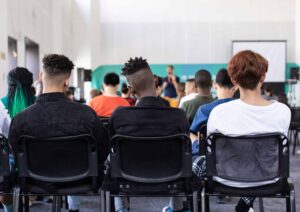There is a growing epidemic of student loneliness on our university campuses.
Could the missing piece of the puzzle be committing more resources to doing academic societies well?
Sense of belonging has been the phrase on everybody’s lips for the last year or so, and for good reason. There’s lots of research to suggest that when students feel they fit in at their university, they have a better time (and consequently, achieve better too).
There’s even more promising practice coming from different corners of the sector, showing the importance of building belonging early.
But still, the dots haven’t been joined up fully when we think about how universities can better facilitate belonging through the development of an academic society provision that engages more students.
Fitting in fit
The significant role academic societies can play can be made clearer if you consider belonging as needing students to feel a sense of both “academic fit’ and ‘social fit’.
Academic societies straddle the worlds of academic fit and social fit. Academic fit is all about students fitting in and feeling accepted with their academic peers and as part of a course cohort. Social fit is about feeling part of a community, connecting with peers, and engaging with campus life, with more of a focus on non-academic activities.
Academic societies, if we see them as the bridge between the “academic world” of the university and the “social world” of the students’ union, are well placed to do the challenging work of bringing together these aspects of belonging in an appealing and accessible way for students.
Still, the sector is questioning how academic societies currently work, who they work for, and how they could work more effectively for more students – just see recent articles on Wonkhe discussing the need for stronger connections, building community through academic-based socialising, and even school plays.
Yet universities still seem confused by where academic societies sit and how responsible should they be, really, for societies run out of their students’ unions?
From the work I’ve been doing the past few years on the aptly named Academic Societies Funding Scheme as a collaborative project between Newcastle University and Newcastle University Students’ Union (NUSU), my view is that all universities could be doing more to invest in their academic societies and make a positive difference in facilitating students’ sense of belonging to their academic discipline – all whilst maintaining students’ autonomy over their societies.
Let’s talk academic societies funding
The Academic Societies Funding Scheme was developed in 2022 out of a bid led by NUSU sabbatical officers, who wanted to see university funding provided for academic society committees to:
- A) deliver welcome events designed to support sense of belonging and community-building.
- B) offer free 6-weeks membership to academic societies for all students at the start of the academic year.
The scheme invited student committees of academic societies (defined as all course-based societies or those closely linked to an area of study) to apply for funding to deliver welcome events aimed at creating a sense of belonging and community for students in the first 6-weeks of the new academic year.
Applications were successful where committees had outlined plans of events which had a clear focus on helping to make connections with other students studying, or interested in, the academic discipline.
Classic “SU events” which societies put on included quiz nights, pizza socials, and coffee mornings – but some societies also thought outside the box and included events like city tours, collaborations with societies like Pilates and Zumba, and one successful society led a series of cooking workshops which were booked up within hours of being posted.
The enhanced offering of welcome events was useful for committees, who often start the new academic year with limited funds and leftovers from the previous year, to have the funded opportunity to showcase their society at its best and entice new members to join. Importantly, it was well-received by students too, particularly for new stage one students, those returning after placement years, and postgraduates.
They were pleased to see a range of activities offered by societies linked to their course in the crucial first few weeks, where students are seeking out ways “in” to feel part of their course and stave off the loneliness and isolation that can come swiftly after induction is deemed to be over.
Free 6-week membership was the other arm of this intervention; it felt especially important in the cost-of-living crisis to offer free options of participation for students to try out an academic society. The potential barriers to joining a society are many, but financial pressures are increasingly affecting students’ choices about getting involved in extracurricular activities.
To look for ways to continue to keep society membership affordable for the students most in need of financial support, the scheme aligned with the opening of applications to NUSU’s Participation Bursaries, which cover some costs of extracurricular participation for eligible students, broadly following OfS criteria for Access and Participation Plan’s target student groups.
(Also, if you’re looking for something to try and address the ‘insufficient personal support’ EORR for your APP, designing an intervention around improving access to extracurriculars like societies could be a good place to start…)
Co-creation with students is key
The success of a scheme like this hinges on a few factors. One, that there is funding available from the university – and the commitment to invest. Two, that the control of what societies put on remains in the hands of the student committees.
Although committees received guidance on the kinds of activities that wouldn’t be funded – for example, a white t-shirt bar crawl is hardly the most inclusive way to build belonging, so alcohol-centred events weren’t covered by this funding – it was their choice for what their events looked like and how they spent the money.
As long as they showed an understanding of how their event might facilitate belonging and community-building, it was up to them how they put that into practice. The university should be involved insofar as supporting with funding and communicating the scheme with academic units to give the societies a sense of legitimacy to new students and staff, but the decisions on the ground need to stay with the students.
The final factor that has made the scheme work in Newcastle is student-led evaluation. For the past two academic years, the scheme has been evaluated both in terms of process and impact, led by a student intern.
Here is another place the university can make itself useful – I’ve been supporting the intern as an “evaluation mentor,” training them in using Theory of Change as the backbone of understanding whether the intervention is making the intended changes or not.
Our evaluations have directly influenced how the scheme has run, with our intern making key recommendations to improve the scheme’s timeline, funding processes, and guidance given to societies. Student-led evaluation is powerful – students are the experts in their own experience, and their insights can bring out ideas staff wouldn’t have thought about.
What then, have we found?
For this academic year (2023/24), 4,203 students ‘purchased’ the free 6-week membership for an academic society before the scheme end date of 31st October. Of those, 123 responded to our survey sent out in early November. Here’s a sample of what they said.
- 64% of students agreed with the statement ‘I feel a sense of belonging to my academic society’ (Strongly Agree and Agree).
- 74% of students agreed with the statement ‘I feel like attending welcome activities helped improve my sense of belonging to my academic society’ (Strongly Agree and Agree).
A majority of respondents reported feeling a sense of belonging associated with their academic society. Interestingly, a higher percentage responded positively to the welcome events, suggesting the welcome events were particularly influential.
Belonging is complicated, personal, and can take time to develop. The early signs, however, support the idea that academic societies, particularly those with well-considered welcome events designed to foster community, can be a real source of belonging for students.
As we asked these questions early in the term, some students are likely to still be finding their feet and not be sure of whether they feel like they belong yet. 28% responded neutrally (Neither Agree nor Disagree); in the future we may look at asking this question again further into term to see how feelings of belonging might change.
- 68% of students had already purchased their full society membership after the end of the free 6-week membership trial at the time of the survey one week later.
- 76% of students said the opportunity to try the society for free had affected their choice to join or not.
Those that did purchase their membership said they had been influenced by enjoying the welcome events and wanting to continue to participate in the social activities. For those that hadn’t purchased their membership, there were some who said they couldn’t afford to, and others felt they had no time to participate.
A few respondents felt their society experience hadn’t been welcoming enough to encourage them to continue – a concern we need to follow up on if we want academic societies to be safe spaces to belong for all students.
Building on belonging
Focusing on building belonging in the academic discipline is vital for the wellbeing and happiness of students. There is room for universities and students’ unions to look at ways they could collaborate more closely, or make different use of funding, to better support academic societies to be a vehicle for sense of belonging for all students. Funding is important, where possible, to demonstrate that this is being taken seriously and provide academic societies with the resources they need.
Retaining student society committees as the ones who shape what welcome events look like for their peers is key – after all, they know best what their peers might want to participate in. Engagement from staff and seeking ways to build belonging into the curriculum is important too but shouldn’t be overshadowing the power of students connecting directly with other students.
And finding ways to include students as evaluators to keep an eye on how all this is actually working for students is something all university-SU partnerships should be striving to include in their interventions. Working with students as partners will get us closer to a sense of belonging for all students who want to be part of their academic community.
The full student-led evaluation report for the Academic Societies Funding Scheme 2023/24 can be found on the Inclusive Newcastle Knowledge Centre website for anyone interested in learning more.




